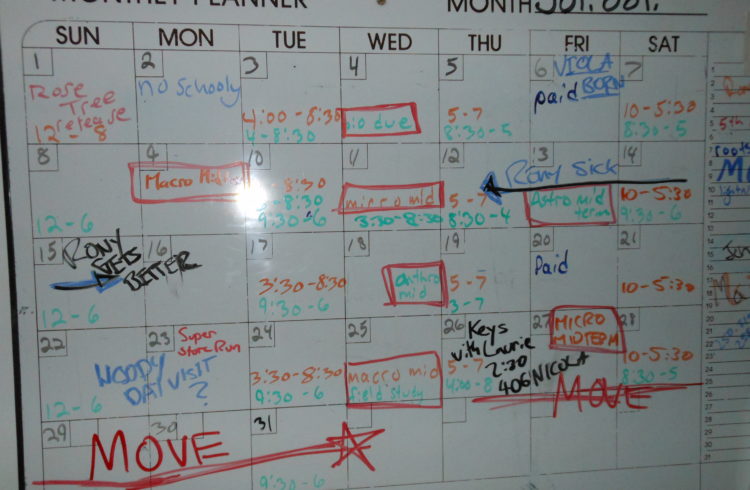When I was on the programming team at a non-denominational church, we’d open our planning meetings with the prayer, “Lord, guide us as we plan our church’s services”. We’d then pull out the congregation’s master activity calendar in order get a birds’-eye view of what activities were on the schedule.
Next, we’d do a little creative brainstorming to think about what music and other creative elements we could use to support the theme of the upcoming sermon series. Where could we use a video? What about a special reading? We’d think through how to best transition from the content of the message into communion, the once-a-month P.S. on our sermon-centric low-church liturgy.
We also used our calendar for strategic planning. When would we slate announcements for the upcoming VBS? How far in advance of our big Christmas outreach services would we have auditions for those who’d play a key role in the service? We wanted to make sure we kept local school schedules and community events in mind in order to minimize schedule conflict for our congregation’s families.
Giving the Calendar a Second Thought
Frankly, we treated the calendar as if it was our servant. We never questioned how our view of the calendar affected our worship, formed our identity as followers of Christ, or called us to live on mission. We simply fit our own plans onto the civil calendar, and went on with our regularly-scheduled programs without a second thought.
In the years since I left that position, I’ve seen a movement toward some low-church worship gatherings experimenting with formal liturgy or organizing their worship cycle around the Christian calendar. Traditional mainline churches have long used the church calendar as the structure for their corporate worship.There are some differences in dating and emphases between the calendar of the West (Roman Catholic and Protestant) and the one used by Eastern (Orthodox) churches. Messianic congregations (and a few Christian groups including some independent Charismatic churches and the Church of God denomination) base their yearly worship cycle on the Jewish festal calendar. We never questioned how our view of the calendar affected our worship Click To Tweet
Calendars Tell a Story
As I explored the history and usage of both the Jewish and Christian calendars, I recognized that each one tells a story about God, each one of us, and the way in which we live corporately as his followers in real time in this world. I welcome the countercultural movement toward worshipping God via the rhythms of ancient calendar. That said, I recognize for some there is a novelty factor in moving to the Church calendar, for example. It can be a refreshing pendulum swing away from the weekly reinvention of the wheel of the sort I had when I was planning and producing worship services in the non-denominational congregation.
But I’d like to suggest that without some meaningful reflection about the “why?” behind the practice, a new calendar or experimentation with liturgy runs the risk of becoming just a faddish replacement for not doing low church worship anymore. A reaction is not the same thing as a well-realized vision.
That vision should lead us beyond a new (old!) organizing structure for our worship gatherings. Author Laurence Hull Stookey offers a compelling picture of how the Christian calendar is meant to re-form us:
The Christian story reaches back to the Exodus of ancient Israel and before and stretches forward to the descent of a new heaven and a new earth and beyond. Indeed, it can be said that Christians are to assume a cruciform posture: Standing upright with feet firmly planted in the present, we stretch out one arm to grasp our heritage and the other arm to lay hold of our hope, standing thus, we assume the shape of our central symbol of faith: the cross. If either hand releases its grip, spiritual disaster threatens as the sign of the cross becomes misformed.
Our calendar isn’t merely about how we organize our worship. It is about discipleship. In Moments & Days: How Our Holy Celebrations Shape Our Faith, my own book that emerged from my own questions and experiences with both Jewish and Christian calendars, I noted:
God tells us in Deuteronomy 6:7 we are to repeat and keep on repeating to our children the commands he has given us. This repetition was meant to take place within the structure of a family’s daily life and inside the context of an entire community participating in a weekly and yearly rhythm of feasts, fasts and festivals. The Jewish and Christian calendars each remind us that we are part of a larger story. Both calendars frame time in terms of God’s salvation story. These calendars do not exist so we can pencil in days of celebration and sorrow alongside our oh-so-important schedules. Instead, these calendars demand we prioritize our time according to their rhythms, because their rhythms represent God’s saving work in our lives and in the world.
A religious calendar certainly doesn’t impart instant faithfulness to adherents. A cursory glance backward through history reminds us that the Chosen People had a calendar given them by God and still drifted into idolatry.
The church developed her own calendar and has her own messy, chaotic, divisive history. The Christian calendar reframed some of the Jewish feasts and flirted with blending some of the popular festivals of the majority pagan culture with their own worship. Were these latter impulses a poorly conceived attempt to make the church appear relevant to the culture? Or were they located in the desire to reclaim for God’s glory these days that were once given to idol worship?
There’s no single clear answer to those questions, any more than to note that there truly is nothing new under the sun. The contemporary church continues to wrestle with the tension between Jesus’ call to pursue holiness by being in the world but not of it (John 17:15-16) and his command to go into the world to share the gospel (Matthew 28:18-20).
Whose Time?
In the case of both the Jewish and Christian calendars, our tension is resolved by living into the truth each in its own way proclaims to us: You and I are not the measure, or the focal point, of time. God is. Yet each calendar also tells us how valuable we are to him. He measures out of eternity each moment of our lives, and gives us this time so we will learn his character and walk in his ways. The Church Calendar reminds us that you and I are not the measure, or the focal point, of time. Click To Tweet
Think of all the ways in which each one of us uses civil calendar to organize, apportion, and dole out our time. Our calendars and scheduling tools allow us to keep rehearsing the untruth that our schedules are the measure of our lives. The Christian calendar and the Jewish calendar from which it emerged are incredibly countercultural. They declare to us as a community of called-out people that we are living a different, eternal reality – a reality that is forming us in real time into the image of our crucified, risen Messiah.






Missio Alliance Comment Policy
The Missio Alliance Writing Collectives exist as a ministry of writing to resource theological practitioners for mission. From our Leading Voices to our regular Writing Team and those invited to publish with us as Community Voices, we are creating a space for thoughtful engagement of critical issues and questions facing the North American Church in God’s mission. This sort of thoughtful engagement is something that we seek to engender not only in our publishing, but in conversations that unfold as a result in the comment section of our articles.
Unfortunately, because of the relational distance introduced by online communication, “thoughtful engagement” and “comment sections” seldom go hand in hand. At the same time, censorship of comments by those who disagree with points made by authors, whose anger or limited perspective taints their words, or who simply feel the need to express their own opinion on a topic without any meaningful engagement with the article or comment in question can mask an important window into the true state of Christian discourse. As such, Missio Alliance sets forth the following suggestions for those who wish to engage in conversation around our writing:
1. Seek to understand the author’s intent.
If you disagree with something the an author said, consider framing your response as, “I hear you as saying _________. Am I understanding you correctly? If so, here’s why I disagree. _____________.
2. Seek to make your own voice heard.
We deeply desire and value the voice and perspective of our readers. However you may react to an article we publish or a fellow commenter, we encourage you to set forth that reaction is the most constructive way possible. Use your voice and perspective to move conversation forward rather than shut it down.
3. Share your story.
One of our favorite tenants is that “an enemy is someone whose story we haven’t heard.” Very often disagreements and rants are the result of people talking past rather than to one another. Everyone’s perspective is intimately bound up with their own stories – their contexts and experiences. We encourage you to couch your comments in whatever aspect of your own story might help others understand where you are coming from.
In view of those suggestions for shaping conversation on our site and in an effort to curate a hospitable space of open conversation, Missio Alliance may delete comments and/or ban users who show no regard for constructive engagement, especially those whose comments are easily construed as trolling, threatening, or abusive.